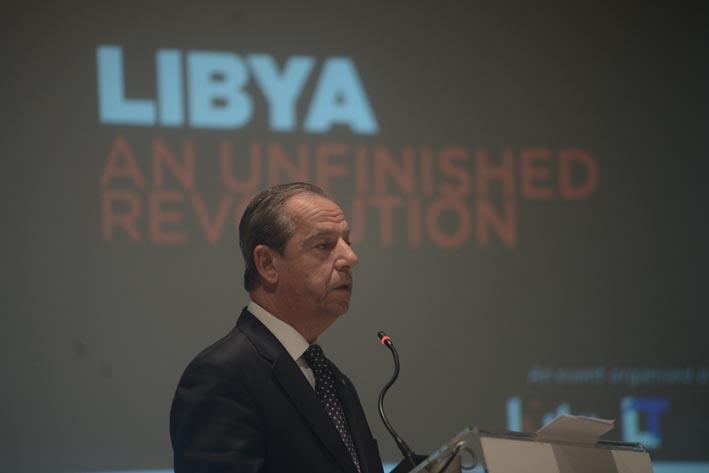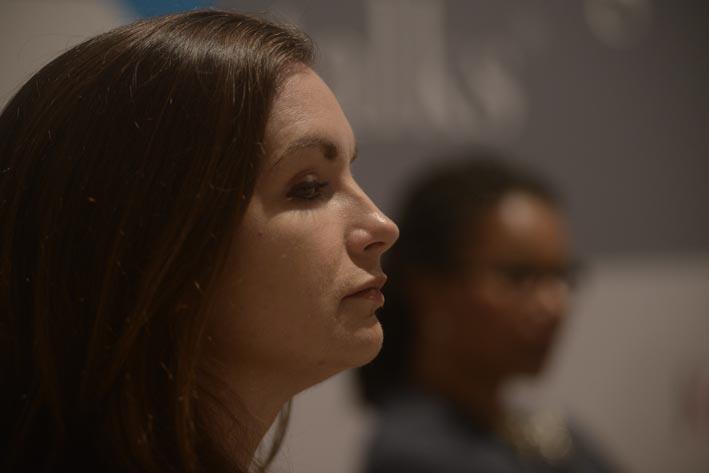Former Prime Minister Lawrence Gonzi today said he believes there are no easy answers and no simple solutions to the Libyan crisis.
He was addressing a debate held at the University of Malta titled “Libya – An unfinished revolution”, organised by Kite Group and Leading Talks, with The Malta Independent as media partners.
He put forward some constructive considerations at “this very delicate stage of the Libya saga. First of all, the international community – and especially the European community - must continue to believe that Libya and the Libyan people can and are able to resolve their differences and to translate the dreams that inspired their 2011 uprising into reality”.
“From the start of the Arab Spring, that which led me and my government in adopting a number of high risk decisions in 2011, was the notion that as a sovereign people Libyans had the right to see their will prevail, to have their aspirations expressed openly and freely, to have their ambitions for their country achieved for their children and for their future generations”.

The former Prime Minister went on say that “no authoritarian regime has the right to forcibly suppress the people’s aspirations to live in a democratic state where human rights and freedoms are protected and guaranteed to one and all and where rule of law prevails. This was my conviction when we decided not to return the two mirage jet fighters who sought refuge in Malta, to Libya”.
Dr Gonzi wished he could meet to celebrate a peace in Libya on the 4 th anniversary of the February 17th revolution.
“As we meet, within our neighbouring country, divisions between those who were once united in toppling the Gaddafi Regime, have grown steadily deeper, with the country now finding itself torn between broader loyalties to two parliaments and two governments, with terrorist organisations, such as the Islamic State, profiting from such divisions to impose their ruthless rule on parts of the country”.
Dr Gonzi touched upon the “difficult time” faced by the Libyan people. “I am sure they desire nothing more than being able to live in peace, decide their own destiny, send their children to school, go to work and earn a decent living like every other normal human being”.

A few questions
“I believe we need to ask ourselves a few difficult questions; Do we turn a blind eye to all of this? Do we resign ourselves to what appears to be an inevitable collapse of a country rich in history, culture, heritage and resources? Worse still, do we surrender and give way to those who hold that Libya can only survive under a dictatorship that is free to threaten, kill, victimise and torture everyone into submission?”
Dr Gonzi fully supports the common stand adopted by the Maltese and European political forces in supporting the efforts of the Special Representative of the Secretary General of the United Nations, Ambassador Bernardino León, “in his efforts to bring the main parties in Libya to the negotiating table and in promoting a structured dialogue aimed at bringing together representatives from a broad spectrum of the Libyan political, military and social landscape”.
Dr Gonzi hopes that the Libyan factions understand that this is the time for them to unite in a common front against all that which threatens division”.
Withdrawal from talks
The former Prime Minister stressed his hope that those political forces who, two days ago, stated that they would withdraw from future talks review their position. “withdrawal from such talks would only exacerbate the current situation of widespread violence and give greater opportunity for terrorist forces to operate in the country”.
“Certainly the current situation in Libya is a cause of grave concern to neighbouring states, including Malta, and beyond. However, our greatest concern is for the welfare and well-being of the Libyan people”.
“in the past days we have witnessed events that have continued to deeply shock the conscience of humanity, including the beheading of 21 men for no other reason than their religious belief and nationality, the 41 killed and many injured in the deadly bomb attacks in al-Qubbah and only three days ago the murder of a young female popular blogger and civil rights activist, Intisar Al-Hasiri and her aunt in Tripoli”.

Benghazi is ripping itself apart
Journalist and Analyst in Libya Mary Fitzgerald spoke of the revolution against Gaddafi. “People felt like everyone and no one was in charge. She met lawyers and activists, saying that Benghazi was proud to have given birth to a revolution and by the end of a year, with the help of a Nato-led intervention, Gaddafi’s rule had ended”.
“When I see images of some Benghazi neighbourhoods, I am reminded of Aleppo. As a BBC journalist who recently made a rare report from there observed: Benghazi is ripping itself apart”.
“Regions, communities and social spheres have been damaged, where families no longer speak with one another as they disagree on how the situation can be resolved”.
Cynicism about democracy is all over the place, she said. A young man told her that they don’t have politics, they have militia politics.
At least 400,000 have been driven from their homes, she said, with a new generation of exiles becoming apparent. Mrs Fitzgerald, spoke of major damage to airports, cities and oil fields, adding that a doctor at Benghazi’s largest hospital told her “We are running on empty (referring to medicines)”.

The prospect of economic collapse
“Libya faces the prospect of economic collapse in the coming years and among the chaos, Islamic extremists see opportunity”.
As the poison of polarisation seeks into the fabric of modern society, paranoia has swept through the country.
A Libyan speaking with Mrs Fitzgerald told her - “People talk of two governments, however Libya is not being governed in any real sense by either of them. We are governed by fear”.
“We can say that each side has an Achilles heel. Tripoli has a tactical alliance with radical Islamists, including the UN-designated Ansar Al-Sharia, and the eastern side has elements linked to the former regime”.
“Of more significance to the current crisis, is the rivalry between regions, such as the elites of the former regime, and those who prospered after the revolution.”

She witnessed both of Libya’s post Gaddafi elections. She said that she spent last year’s elections in both Bengazi and Tripoli, which saw a dramatic drop in turnout. Many People in Bengazi didn’t care for elections, they said that security was more important than democracy.
In Tripoli, many people saw little point in voting, “when the men with guns are the real power in Libya”.
“Libya’s experiment with democracy has been marked not only by militia politics, but also the politics of exclusion".
She mentioned a law passed, which denied the ability of Gaddafi regime officials from being to hold any office.
“How might the UN dialogue fare? The challenge of such a process is deciding who to include, who is truly representative.

Each camp is beset by internal tensions and fractures, several which have already erupted into public disagreements over the dialogue process. Notions of hierarchy can be nebulous”.
She mentioned key players, being the militia alliance backing the Tripoli power, and Hiftar.
“Hiftar” for his part has not stated his position and is likely to be an obstacle towards any future agreement. He is earmarked as a military commander, yet many in the opposing camp are adamant he must exit the scene to ensre peace.
“Mohammed Al-Tumi, a local councillor in Misrata told me “We want to stop bleeding,” while another person said, “war is hell”.
“The UN continues to insist that a unity government is Libya’s best hope to address the threat posed by Islamic State. If no agreement is made, then the country faces the possibility of a three-way war”.

Terror organisations can only be defeated by a strong and united Libya – Roberta Metsola
Extremists cannot be allowed to rule Libya, PN MEP Roberta Metsola has said.
She stressed that the Libyan people are disillusioned by the situation. “We do not have answers to the Libyan situation and we are not the ones to tell them what they need to do with their own country, however we need to help them. We need to support them to bring the people around the table to discuss the issues”.
“The time pressure is real and should the process fail we must be prepared for the consequences. Malta can offer its unique position to help find common ground, while encouraging the steps taken by Libyans to reach out to other factions”.
“We must make use of our diplomatic tools and utilise the expertise garnered over the past years for a clear approach to Libya. The perception of policy being created on the hoof must be avoided.”
Lets give diplomacy all the space it needs to find a solution, she said. “The longer the political status quo remains, the stronger the terror groups will grow and the harder it will become to find a solution. We cannot afford a failure”.
“No religion is responsible for terrorism and IS is not a representative of Islam. It is essential to keep making this pint. We are the only eu country to refuse to join the fight against terrorism. It has nothing to do with neutrality. It is in our national interest to fight terrorism just like we fight criminality”.
“Malta’s strength will come from the knowledge of forming part of an international alliance. We should join sooner rather than later”.
“The UNHCR warned worsening situation will see more migrants. We should expect that if Libya descends into chaos, we will see a flood of migrants. We should draw up plans for Malta to return to its role of a humanitarian hub”.
“ISIS is a terror organisations and we should stand against it”.
“We should not underestimate the impact of the situation on the local economy. We are moving from a temporary lull in activities to a shut down of business in Libya”.

Post Gaddafi revolution signs were encouraging - Ian Borg
Parliamentary Secretary Ian Borg said that the signs post 2011 were encouraging, he said, referring to the democratic government set up as well as business returning to normal back then.
“Today Libya is the country with the largest Mediterranean shoreline, a breeding ground for jihadists,” he said.
“Malta has long been sounding the alarm, advising the EU of problems in Libya”.
“The country needs support in building its institutions and capacity building of key authorities, particularly those offering basic services”.
“Unfortunately the international contribution fell short so did the efforts from the EU”.
“As a result the internal conflict that developed in Libya was an extension of the country’s institutional fragmentation”.
Religion is but one among many drivers of the conflict, Dr Borg explained. “The conflict is neither ethnic nor sectarian. The vacuum from the internal conflict has opened the door for elements within Libya, elements with roots in virtual irony”.
He reiterated his full support to the UN’s attempts for peace talks, in efforts to find end to conflict with national unity government.
“There is much hope for agreement. “A peace process cannot be maintained if interrupted by violence on both sides. In the event of a conclusion not being possible, a long war of attrition based on conflicts or even a full blown civil war drawing in many other factions and tribes could occur”.
“This would lead to an influx of irregular migration”.
Photos by Jonathan Borg